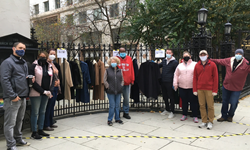
Coat drive by the Church of the Epiphany in downtown Washington DC, to ensure people experiencing homelessness have basic needs met.
“We know much more about COVID-19 and how it spreads now than we did in the early days of the pandemic,” said Nagulan Nesiah. “This new campaign, shared through our village Savings with Education groups, will help to dispel the misconceptions about the virus.”
NEW YORK (PRWEB)
August 26, 2021
Episcopal Relief & Development is continuing to support partners in the United States and around the world in providing targeted assistance in response to the COVID-19 pandemic.
The organization is partnering with local organizations in Brazil, Sri Lanka and Tanzania on additional emergency responses to support the most vulnerable populations. These international projects are supported primarily by a generous grant from Trinity Church Wall Street.
In Tanzania, with Episcopal Relief & Development support, Mothers’ Union is building on the foundation of its 2020 COVID-19 educational awareness campaign. Working with local government departments, the agency is updating the materials to reflect current guidance and information about the virus. The curriculum will be taught to savings group leaders who were trained last year and to leaders from an additional 16 high-risk dioceses. The leaders will then bring that information back to share with their groups and local communities.
“We know much more about COVID-19 and how it spreads now than we did in the early days of the pandemic,” said Nagulan Nesiah, Senior Program Officer, Disaster Response and Risk Reduction, Episcopal Relief & Development. “This new campaign, shared through our village Savings with Education groups, will help to dispel the misconceptions about the virus and will help equip communities to better protect themselves.”
In the United States, Episcopal Relief & Development is supporting the Episcopal dioceses of East Tennessee, Georgia, Puerto Rico, Southwestern Virginia and Washington on new responses to meet additional needs created by the pandemic. The dioceses are assisting marginalized communities through vaccination clinics, incentives for those who receive the vaccine, gift cards for school supplies, assistance in applying for SNAP benefits, medical care, and more.
Vulnerable individuals and families in the Appalachian region are historically underserved. Additionally, the area was already experiencing an economic recession before the pandemic began, the effects of which were multiplied by the impact of COVID-19. The Episcopal Diocese of Southwestern Virginia is providing relief this summer to these communities through Grace House on the Mountain’s network in the region. Grace House on the Mountain, a non-profit community center run by the diocese, is replenishing food pantries to feed 1,500 people and is covering utility expenses for approximately 25 families. Additionally, the diocese is offering assistance with medical expenses, including expenses for care due to COVID-19.
“Many families in the Appalachian region are living just below the poverty line,” says Katie Mears, Senior Director, US Disaster Program, Episcopal Relief & Development. “Through the efforts of dioceses like Southwestern Virginia and East Tennessee, families experiencing economic hardship caused by the pandemic are getting the help they need.”
Donations to the COVID-19 Pandemic Response Fund will enable Episcopal Relief & Development to continue to provide assistance to vulnerable communities impacted by the coronavirus, both in the United States and around the world. Learn more about Episcopal Relief & Development’s response to the COVID-19 pandemic here.
ABOUT EPISCOPAL RELIEF & DEVELOPMENT:
For over 80 years, Episcopal Relief & Development has been working together with supporters and partners for lasting change around the world. Each year the organization facilitates healthier, more fulfilling lives for more than 3 million people struggling with hunger, poverty, disaster and disease. Inspired by Jesus’ words in Matthew 25, Episcopal Relief & Development leverages the expertise and resources of Anglican and other partners to deliver measurable and sustainable change in three signature program areas: Women, Children and Climate.
Share article on social media or email:

